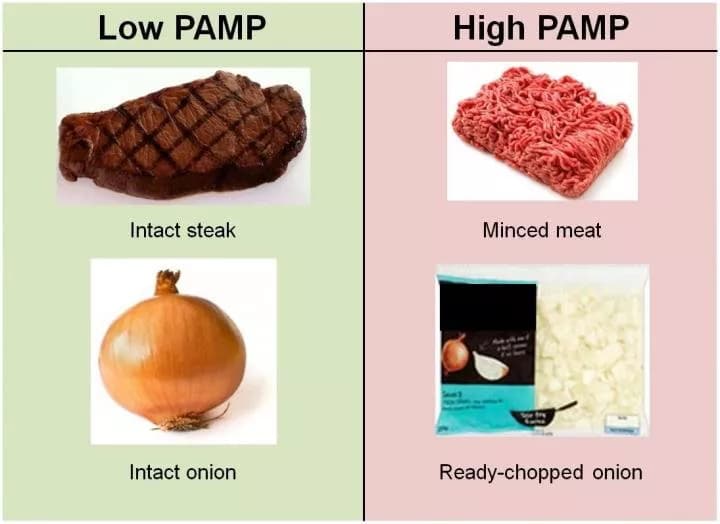
Bacterial Molecules Discovered In Processed Foods Could Unlock Key To Healthier Diets
"In a study of 11 healthy human volunteers, adherence to the specially designed low PAMP diet for just one week caused a significant 18% reduction in LDL (bad) cholesterol and an 11% reduction in white blood cell count. Volunteers also lost weight (on average 0.6 kg) and their waist circumference was reduced (average 1.5 cm), during the low PAMP diet. These are key risk factors for coronary artery disease and Type II diabetes," according to Dr Clett Erridge, University of Leicester.
Our favourite foods could be made healthier thanks to a new technique developed by the University of Leicester which has identified harmful bacterial molecules in certain processed foods such as burgers and ready meals.
The study identifies a particular kind of contaminating molecule known as 'pathogen-associated molecular patterns' (PAMPs), which are released by certain types of bacteria as they grow during some food processing and refrigeration processes, and may increase our risk of developing conditions such as coronary artery disease and Type 2 diabetes.
PAMPs are undetectable in non-processed and fresh foods, suggesting that they develop during the manufacturing process.
Dr Clett Erridge from the University of Leicester's Department of Cardiovascular Sciences who led the study explained: "It has been understood for many years that frequent consumption of highly processed foods, particularly processed meats, is associated with increased risk of developing a range of diseases, including cardiovascular disease, Type 2 diabetes and obesity. Our recent findings have uncovered a potential mechanism by which certain types of processed food increase risk of developing these diseases.
"In essence, we have discovered that contaminating molecules that arise in processed foods from the overgrowth of a specific type of bacteria during refrigeration or food processing can cause our immune systems to over-react in a manner that might be damaging to health when we eat foods containing these molecules."
After testing volunteers on a diet low in PAMPs for one week, researchers discovered an 11 per cent reduction in white blood cell count and an 18 per cent reduction in LDL (bad) cholesterol -- which if maintained would be equivalent to a greater than 40 per cent reduction in risk of developing coronary artery disease.
The volunteers also experienced a reduction in weight (on average 0.6kg) and waist circumference (average 1.5 cm). The reductions in waist circumference and white cell count are equivalent to a greater than 15 per cent reduction in risk of developing Type 2 diabetes.
When the same volunteers were fed food enriched in PAMPs, the beneficial changes were reversed, highlighting the negative effect PAMPs appear to have on the health of an individual.
This was an experimental study, which is one of the ways that we establish a relationship between cause and effect.
The researchers believe that their new method of detecting PAMPs could be used by food manufacturers to help identify where in their production process the PAMP molecules are arising in foodstuffs, such as which parts of machinery or which raw materials introduce contamination to their products.
Dr Erridge added: "Crucially, we have found that some processed foods do not contain these molecules, and our results suggest it should be possible to manufacture almost any current foodstuff in a manner that results in a low content of pro-inflammatory PAMP molecules. Our method can also be used to monitor progress in efforts to clean up the production process.
"The present work suggests that removing these molecules from common foods could provide a health benefit to consumers and suggest a potential means of making some of our favourite foods healthier without any appreciable change to taste, texture, cost or ingredients."
Key processed foods found to frequently contain high levels of PAMPs include foods containing minced meat (including sausages and burgers), ready meals (especially lasagne, bolognese), some cheeses, chocolate and some types of ready-chopped vegetables, such as onions.
Foods containing these as ingredients, such as sauces and sandwiches, were also found to have a relatively high risk of PAMP contamination.
The study suggests that when food is absolutely fresh, including any type of meat, fruit or vegetable, it contains undetectable levels of PAMPs. However, once it has been chopped finely, especially if minced, the PAMP content rises rapidly, day on day, even when stored at refrigeration temperature.
The above post is reprinted from materials provided by University of Leicester. Note: Materials may be edited for content and length.
Disclaimer: DoveMed is not responsible for the adapted accuracy of news releases posted to DoveMed by contributing universities and institutions.
Primary Resource:
Herieka, M., Faraj, T. A., & Erridge, C. (2015). Reduced dietary intake of pro-inflammatory Toll-like receptor stimulants favourably modifies markers of cardiometabolic risk in healthy men. Nutrition, Metabolism and Cardiovascular Diseases.
Related Articles
Test Your Knowledge
Asked by users
Related Centers
Related Specialties
Related Physicians
Related Procedures
Related Resources
Join DoveHubs
and connect with fellow professionals

0 Comments
Please log in to post a comment.